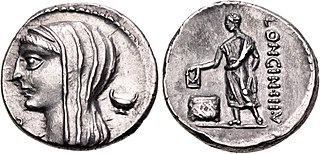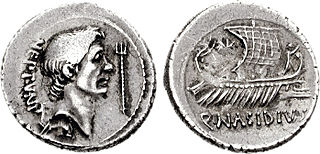
The gens Lucilia was a plebeian family at ancient Rome. The most famous of the gens was the poet Gaius Lucilius, who flourished during the latter part of the second century BC. Although many Lucilii appear in Roman history, none of them obtained any of the higher offices of the Roman state.

The gens Cassia was a Roman family of great antiquity. The earliest members of this gens appearing in history may have been patrician, but all those appearing in later times were plebeians. The first of the Cassii to obtain the consulship was Spurius Cassius Viscellinus, in 502 BC. He proposed the first agrarian law, for which he was charged with aspiring to make himself king, and put to death by the patrician nobility. The Cassii were amongst the most prominent families of the later Republic, and they frequently held high office, lasting well into imperial times. Among their namesakes are the Via Cassia, the road to Arretium, and the village of Cassianum Hirpinum, originally an estate belonging to one of this family in the country of the Hirpini.
The gens Pontia was a plebeian family at Rome. Few members of this gens rose to prominence in the time of the Republic, but the Pontii flourished under the Empire, eventually attaining the consulship.
The gens Terentia was a plebeian family at ancient Rome. Dionysius mentions a Gaius Terentilius Arsa, tribune of the plebs in 462 BC, but Livy calls him Terentilius, and from inscriptions this would seem to be a separate gens. No other Terentii appear in history until the time of the Second Punic War. Gaius Terentius Varro, one of the Roman commanders at the Battle of Cannae in 216 BC, was the first to hold the consulship. Members of this family are found as late as the third century AD.
The gens Afrania was a plebeian family at Rome, which is first mentioned in the second century BC. The first member of this gens to achieve prominence was Gaius Afranius Stellio, who became praetor in 185 BC.
The gens Calvisia was a Roman family, which first rose to prominence during the final decades of the Republic, and became influential in imperial times. The first of the gens to obtain the consulship was Gaius Calvisius Sabinus in 39 BC.
Caecina was the name of an Etruscan family of Volaterrae, one of the ancient cities of Etruria. Persons of this gens are first mentioned in the first century BC. Under the Empire the name is of frequent occurrence. As late as the reign of Honorius, we read of the poet Decius Albinus Caecina, residing at his villa in the neighborhood of Volaterrae; and until modern times there has been a family of this name at the modern Volterra. The family tomb of the Caecinae has been discovered in the neighborhood of Volterra; in this tomb there was found a beautiful sarcophagus, now in the Museum of Paris.
The gens Titia was a plebeian family at Rome. The gens is rarely mentioned in the Republican period, and did not rise out of obscurity till a very late time. None of its members obtained the consulship under the Republic, and the first person of the name who held this office was Marcus Titius in BC 31.
Tiberius Canutius or Cannutius was tribune of the plebs in 44 BC, the year of Caesar's assassination. As a supporter of the senatorial party, he opposed the triumvirs, resorting to military force during the Perusine War. He was captured and put to death by Octavianus in 40 BC.
The gens Rutilia was a plebeian family at ancient Rome. Members of this gens appear in history beginning in the second century BC. The first to obtain the consulship was Publius Rutilius Rufus in 105 BC.
The gens Gallia was a plebeian family at Rome. Several members of this gens are mentioned during the first century BC.

The gens Juventia, occasionally written Jubentia, was an ancient plebeian family at Rome. After centuries of obscurity, the gens emerges into history with the appearance of Titus Juventius, a military tribune, in the beginning of the second century BC. The first of the Juventii to obtain the consulship was Marcus Juventius Thalna in BC 163. But the family is renowned less for its statesmen than for its jurists, who flourished during the second century AD.
The gens Ligaria was a minor family at ancient Rome, best remembered for three brothers who conspired against Caesar, and were afterward proscribed and put to death by the triumvirs. According to Cicero, they were of Sabine origin.

The gens Munatia was a plebeian family at Rome. Members of this gens are first mentioned during the second century BC, but they did not obtain any of the higher offices of the Roman state until imperial times.

The gens Nasidia was an obscure plebeian family at Rome. The gens is best known from Quintus Nasidius, one of the admirals of Gnaeus Pompeius Magnus during the Civil War. Although none of the Nasidii are known to have held any of the higher offices of the Roman state, a number are known from inscriptions. A coin of this gens depicts the head of Pompeius and a trident on the obverse, and on the reverse a ship, with the inscription Q. Nasidius.
The gens Oppia was an ancient Roman family, known from the first century of the Republic down to imperial times. The gens may originally have been patrician, as they supplied priestesses to the College of Vestals at a very early date, but all of the Oppii known to history were plebeians. None of them obtained the consulship until imperial times.
The gens Racilia was a minor plebeian family at ancient Rome. Members of this gens are mentioned as early as the fifth century BC, but few of them achieved any prominence in the Roman state.
The gens Satria was a minor plebeian family at ancient Rome. Members of this gens are mentioned in the first century BC, and under the early Empire, but none of them rose higher than the rank of praetor. Otherwise the Satrii are known largely from inscriptions.









